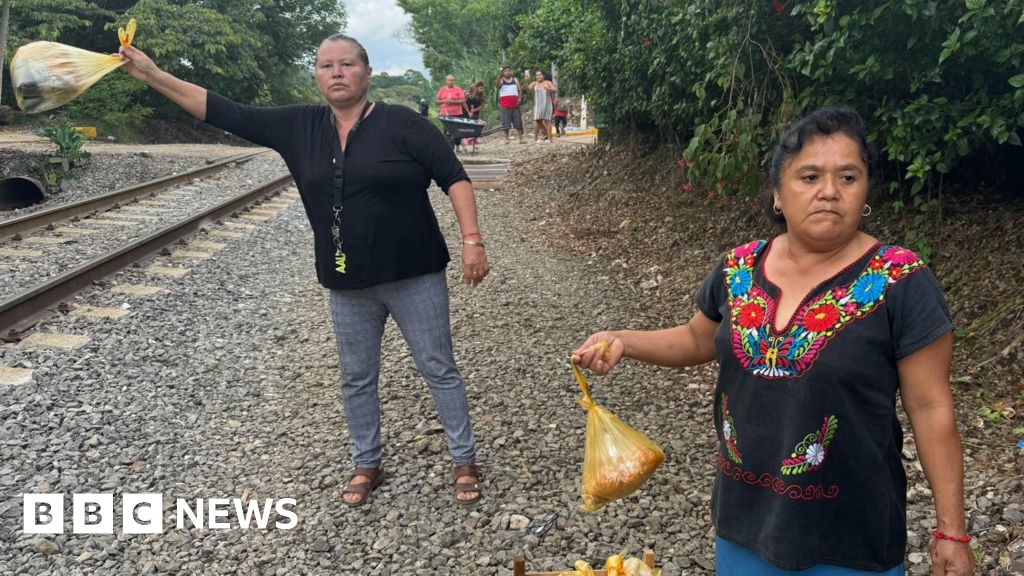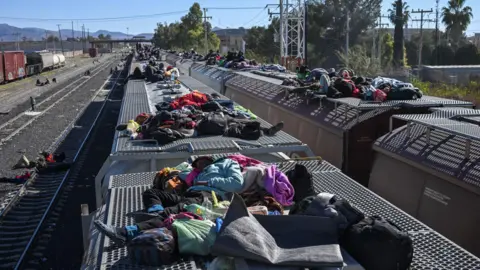 Reuters
ReutersFew people know how perilous the migrant journey across Mexico has become in recent months better than a group of women in the eastern state of Veracruz, known as Las Patronas.
For the past 30 years, as policies towards Central American migrants have hardened on both sides of the Rio Grande, they have unfailingly kept up the same humanitarian gesture to the migrants who pass through their village.
Every day, Las Patronas bag up rice, beans, tortillas, bread, tins of tuna and bottles of water.
As the freight train known as La Bestia, meaning The Beast, approaches, they scramble to the side of the tracks and hold out the food for the migrants travelling on its roofs to grab as they thunder past.
“Gracias! God bless you!” the migrants yell over the deafening noise of the train as it clatters north, a fleeting moment of kindness on what is one of the most dangerous migrant journeys in the world.
Many will struggle to make it much further north.
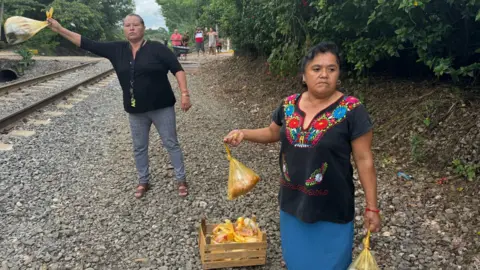

This year, Mexico has stopped around three times as many migrants who have crossed into its territory from Central America as it did a year ago. While the 280,000 interdictions a month by the Mexican authorities have won approval in Washington, they have made life unbearable for those on the road.
“The dream that many call the American Dream has turned into a nightmare”, reflects Norma Romero, the founder of Las Patronas.
Mexico and the United States are at a pivotal point in their relationship.
Mexico has just chosen its first woman president, Claudia Sheinbaum, who will take office in October. The United States, meanwhile, is heading full steam into its election campaign with possibly its first female president in Kamala Harris, or a second Trump presidency on the horizon.
Neither scenario gives Norma much cause for optimism.
“I never put my faith in politics. Rather, I believe in ordinary people who bring about change and who have different ways of thinking,” she says, as her fellow volunteers chop vegetables to flavour the rice.
Nor does she think having a woman at the helm will make any difference in terms of tackling the widespread abuses of migrants in Mexico.
“Sadly, politics hasn’t improved since, well, as long as I can remember. Really, there’s never been any change that has brought any benefit to migrants.”
I first met Norma a decade ago when, as she showed the BBC, the freight trains were heaving with migrants fleeing violence and hardship in their home countries for the prospect of a better life in the United States.
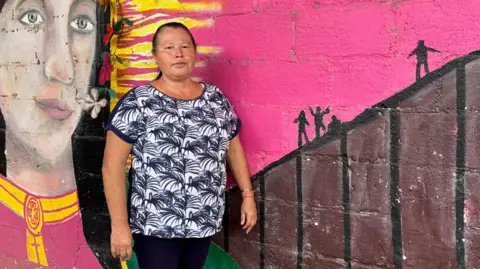

Successive Mexican governments tended not to stop people heading north if they were simply passing through. In the United States, undocumented immigration was not the polarising electoral topic that it has since become.
Today, that attitude has noticeably changed. Particularly in US border states, it is the leading issue heading into November’s vote.
In June, President Joe Biden issued an executive order which grants US Border Patrol the right to deport people who have crossed into the US illegally without processing their asylum-requests. In the first four weeks of the new policy, there was a 40% reduction in detentions on the US southern border.
Norma says Las Patronas have seen noticeably emptier trains in recent weeks – sometimes without any migrants on them at all. She thinks the migrants are using other routes, by bus or on foot.
But, she says, they remain woefully uninformed about such US policy developments or the extent of the obstacles they face on the road:
“The migrants don’t have the basic knowledge they need about what is involved in travelling through Mexico,” she laments. “We see what’s happening to them and try to think about their wellbeing as human beings.”
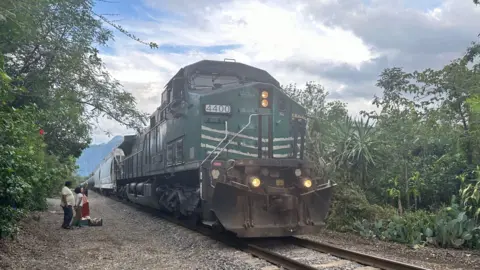

Las Patronas also run a shelter where weary migrants can get a hot meal, a bed, bathe, wash their clothes and receive medical attention.
Among those staying for a few days to rest and gather their strength is Guadalupe, a Salvadoran migrant travelling with her 17-year-old daughter Nicole. She says they won’t travel on La Bestia again, having twice been taken off the freight train by immigration officers.
The experience, she recalls, was brutal.
“They hit a lot of people who were with us and gave others electric shocks with tasers. They almost tasered me too. That was the worst experience we’ve had here in Mexico.”
Given the threat of kidnappings, sexual abuse and extortion by the country’s drug cartels, traversing Mexico is one of the most fraught parts of a journey which, for some, began in the Andes or the Caribbean.
Often though, says Guadalupe, they’re extorted by migration and security officials, the very men and women charged with upholding the law in Mexico.
“Once they take us off the train, many migration officers demand bribes from us. If we have enough money, we can pass. This time, we didn’t, and they sent us back to the border with Guatemala. That was the hardest thing.”
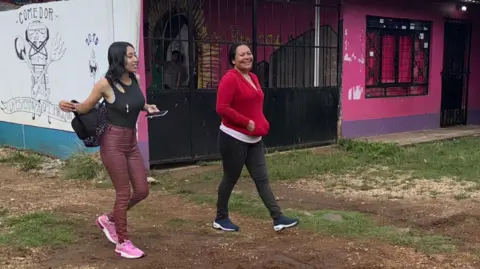

Mexican law enforcement has undoubtedly kept down the numbers of migrants reaching the US’s door.
“There is no crisis in migration at present,” said Mexico’s President, Andrés Manuel López Obrador, recently as he urged the US to bolster development aid to Central America to dissuade people from leaving home in the first place.
Rather than outright deportations – Mexico only sent back around 8,500 people in the first three months of this year – the Mexican authorities have been employing a form of ‘internal removal’ instead. Thousands of detained migrants have been dropped in towns on the border with Guatemala, some 2,000 kilometres from the US border.
The strategy saps the migrants of the funds and energy they need to keep going. Salvadoran migrant, Guadalupe, likens the tactic to a giant game of snakes and ladders:
“It’s very similar. Just like the board game, you have to avoid stepping on the snakes or you’re back to square one. It’s the same here too. If we don’t hide or run faster than the immigration agents, then our journey ends and we’re sent all the way back to the start.”
The BBC repeatedly requested an interview with the Mexican government over undocumented immigration, but no-one was made available.
As another train approaches, Guadalupe helps Norma Romero and the other women to take the food down to the tracks.
No matter who wins in the US, or what their relationship with President-elect Sheinbaum, Norma says Las Patronas won’t turn off their stoves as long as migrants keep coming past.
Listen to ‘Las Patronas’ on The Documentary on the BBC World Service.

